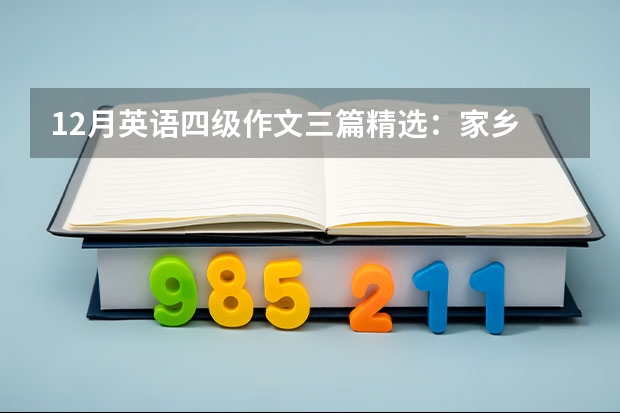四级听力写作阅读各占多少分
2024-11-04 15:08:30 | 炎炎英文培训网
本文目录一览:

四级听力及原文
四级听力及原文参考如下:
以下为第二套英语四级听力(部分)
A 22-year-old Chinese woman who suffered from a persistent cough was shocked to learn that she had a piece of chicken bone lodged in her lung. The unnamed woman
from the province of Shandong started have coughing problems when she was 7 or 8 years old.
For 14 years, she made numerous hospital visits. However, no doctor could identify any problem. Her uncontrollable coughing was a mystery. Finally, the woman got a full body scan at a hospital in the city of Qingdao.
This special medical procedure revealed she had a chicken bone stuck in her lung.

~~~~~英语四级听力材料~~~~
大学英语四级考试试点考试样卷(听力文字稿)Tape Script of Listening Comprehension
Section A
Directions: In this section, you will hear 8 short conversations and 2 long conversations. At the end of each conversation, one or more questions will be asked about what was said. Both the conversation and the questions will be spoken only once. After each question there will be a pause. During the pause, you must read the four choices marked A), B), C) and D), and decide which is the best answer. Then mark the corresponding letter on Answer Sheet 2 with a single line through the centre.
11. W: Simon, could you return the tools I lent you for building the bookshelf last month?
M: Uh, well, I hate to tell you this … but I can't seem to find them.
Q: What do we learn from the conversation?
12. W: I'm going to Martha's house. I have a paper to complete, and I need to use her computer.
M: Why don't you buy one yourself? Think how much time you could save.
Q: What does the man suggest the woman do?
13. W: Bob said that Seattle is a great place for conferences.
M: He's certainly in a position to make that comment. He's been there so often.
Q: What does the man say about Bob?
14. W: Mr. Watson, I wonder whether it's possible for me to take a vacation early next month .
M: Did you fill out a request form?
Q: What is the probable relationship between the two speakers?
15. M: Do you want to go to the lecture this weekend? I hear the guy who's going to deliver the lecture spent a year living in the rain forest.
W: Great! I'm doing a report on the rain forest. Maybe I can get some new information to add to it.
Q: What does the woman mean?
16. W: Wow! I do like this campus: all the big trees, the green lawns, and the old buildings with tall columns . It's really beautiful.
M: It sure is. The architecture of these buildings is in the Greek style. It was popular in the eighteenth century here.
Q: What are the speakers talking about?
17. M: This article is nothing but advertising for housing developers. I don't think the houses for sale are half that good.
W: Come on, David. Why so negative? We're thinking of buying a home, aren't we? Just a trip to look at the place won't cost us much.
Q: What can be inferred from the conversation?
18. M: Would you pass me the sports section, please?
W: Sure, if you give me the classified ads and local news section.
Q: What are the speakers doing?
Now you'll hear two long conversations.
Conversation One
W: Hello, Gary. How're you?
M: Fine! And yourself?
W: Can't complain. Did you have time to look at my proposal?
M: No, not really. Can we go over it now?
W: Sure. I've been trying to come up with some new production and advertising strategies. First of all, if we want to stay competitive, we need to modernize our factory. New equipment should've been installed long ago.
M: How much will that cost?
W: We have several options ranging from one hundred thousand dollars all the way up to half a million.
M: OK. We'll have to discuss these costs with finance.
W: We should also consider human resources. I've been talking to personnel as well as our staff at the factory.
M: And what's the picture?
W: We'll probably have to hire a couple of engineers to help us modernize the factory.
M: What about advertising?
W: Marketing has some interesting ideas for television commercials.
M: TV? Isn't that a bit too expensive for us? What's wrong with advertising in the papers, as usual?
W: Quite frankly, it's just not enough anymore. We need to be more aggressive in order to keep ahead of our competitors.
M: Will we be able to afford all this?
W: I'll look into it, but I think higher costs will be justified. These investments will result in higher profits for our company.
M: We'll have to look at the figures more closely. Have finance draw up a budget for these investments.
W: All right. I'll see to it.
Questions 19 to 22 are based on the conversation you have just heard.
• What are the two speakers talking about?
• What does the woman say about the equipment of their factory?
• What does the woman suggest about human resources?
• Why does the woman suggest advertising on TV?
Conversation Two
W: Sir, you've been using the online catalogue for quite a while. Is there anything I can do to help you?
M: Well, I've got to write a paper about Hollywood in the 30s and 40s, and I'm really struggling. There are hundreds of books, and I just don't know where to begin.
W: Your topic sounds pretty big. Why don't you narrow it down to something like … uh … the history of the studios during that time?
M: You know, I was thinking about doing that, but more than 30 books came up when I typed in “movie studios.”
W: You could cut that down even further by listing the specific years you want. Try adding “1930s” or “1940s” or maybe “Golden Age.”
M: “Golden Age” is a good idea. Let me type that in …. Hey, look, just 6 books this time. That's a lot better.
W: Oh … another thing you might consider … have you tried looking for any magazine or newspaper articles?
M: No, I've only been searching for books.
W: Well, you can look up magazine articles in the Reader's Guide to Periodical Literature . And we do have the Los Angeles Times available over there. You might go through their indexes to see if there's anything you want.
M: Okay. I think I'll get started with these books and then I'll go over the magazines.
W: If you need any help, I'll be over at the Reference Desk.
M: Great, thanks a lot.
Questions 23 to 25 are based on the conversation you have just heard.
• What is the man doing?
• What does the librarian think of the topic the man is working on?
• Where can the man find the relevant magazine articles?
Section B
Directions: In this section, you will hear 3 short passages. At the end of each passage, you will hear some questions. Both the passage and the questions will be spoken only once. After you hear a question, you must choose the best answer from the four choices marked A), B), C) and D). Then mark the corresponding letter on Answer Sheet 2 with a single line through the centre.
Passage One
In the next few decades people are going to travel very differently from the way they do today. Everyone is going to drive electrically powered cars. So in a few years people won't worry about running out of gas.
Some of the large automobile companies are really moving ahead with this new technology. F & C Motors, a major auto company, for example, is holding a press conference next week. At the press conference the company will present its new, electronically operated models.
Transportation in the future won't be limited to the ground. Many people predict that traffic will quickly move to the sky. In the coming years, instead of radio reports about road conditions and highway traffic, news reports will talk about traffic jams in the sky.
But the sky isn't the limit. In the future, you'll probably even be able to take a trip to the moon. Instead of listening to regular airplane announcements, you'll hear someone say, “The spacecraft to the moon leaves in ten minutes. Please check your equipment. And remember, no more than ten ounces of carry-on baggage are allowed.”
Questions 26 to 28 are based on the passage you have just heard.
• What will be used to power cars in the next few decades?
• What will future news reports focus on when talking about transportation?
• What is the special requirement for passengers traveling to the moon?
Passage Two
The period of engagement is the time between the marriage proposal and the wedding ceremony. Two people agree to marry when they decide to spend their lives together.
The man usually gives the woman a diamond engagement ring. That tradition is said to have started when an Austrian man gave a diamond ring to the woman he wanted to marry. The diamond represented beauty. He placed it on the third finger of her left hand. He chose that finger because it was thought that a blood vessel in that finger went directly to the heart. Today, we know that this is not true. Yet the tradition continues.
Americans generally are engaged for a period of about one year if they are planning a wedding ceremony and party. During this time, friends of the bride may hold a party at which women friends and family members give the bride gifts that she will need as a wife. These could include cooking equipment or new clothing.
Friends of the man who is getting married may have a bachelor party for him. This usually takes place the night before the wedding. Only men are invited to the bachelor party.
During the marriage ceremony, the bride and her would-be husband usually exchange gold rings that represent the idea that their union will continue forever. The wife often wears both the wedding ring and engagement ring on the same finger. The husband wears his ring on the third finger of his left hand.
Many people say the purpose of the engagement period is to permit enough time to plan the wedding. But the main purpose is to let enough time pass so the two people are sure they want to marry each other. Either person may decide to break the engagement. If this happens, the woman usually returns the ring to the man; they also return any wedding gifts they have received.
Questions 29 to 31 are based on the passage you have just heard.
• What was the diamond ring said to represent?
• Why did the Austrian man place the diamond ring on the third finger of the left hand of his would-be wife?
• What is the chief advantage of having the engagement period?
Passage Three
“Where is the university?” is a question many visitors to Cambridge ask, but no one could point them in any one direction because there is no campus. The university consists of thirty-one self-governing colleges. It has lecture halls, libraries, laboratories, museums and offices throughout the city.
Individual colleges choose their own students, who have to meet the minimum entrance requirements set by the university. Undergraduates usually live and study in their colleges, where they are taught in very small groups. Lectures, and laboratory and practical work are organized by the university and held in university buildings.
There are over 10,000 undergraduates and 3,500 postgraduates. About forty percent of them are women and some eight percent from overseas. As well as teaching, research is of major importance. Since the beginning of the 20th century more than sixty university members have won Nobel prizes.
The university has a huge number of buildings for teaching and research. It has more than sixty specialist subject libraries, as well as the University Library, which, as a copyright library, is entitled to a copy of every book published in Britain.
Examinations are set and degrees are awarded by the university. It allowed women to take the university exams in 1881, but it was not until 1948 that they were awarded degrees.
Questions 32 to 35 are based on the passage you have just heard.
• Why is it difficult for visitors to locate Cambridge University?
• What does the passage tell us about the colleges of Cambridge University?
• What can be learned from the passage about the libraries in Cambridge University?
• What does the passage say about women students in Cambridge University?
Section C
Directions: In this section, you will hear a passage three times. When the passage is read for the first time, you should listen carefully for its general idea. When the passage is read for the second time, you are required to fill in the blanks numbered from 36 to 43 with the exact words you have just heard. For blanks numbered from 44 to 46 you are required to fill in the missing information. For these blanks, you can either use the exact words you have just heard or write down the main points in your own words. Finally, when the passage is read for the third time, you should check what you have written.
Russia is the largest economic power that is not a member of the World Trade Organization. But that may change. Last Friday, the European Union said it would support Russia's (36) effort to become a W.T.O. member.
Representatives of the European Union met with Russian (37) officials in Moscow. They signed a trade agreement that took six years to (38) negotiate .
Russia called the trade agreement (39) balanced . It agreed to slowly increase fuel prices within the country. It also agreed to permit (40) competition in its communications industry and to remove some barriers to trade.
In (41) exchange for European support to join the W.T.O., Russian President Putin said that Russia would speed up the (42) process to approve the Kyoto Protocol, an international (43) environmental agreement to reduce the production of harmful industrial gases. (44) These “greenhouse gases” trap heat in the atmosphere and are blamed for changing the world's climate .
Russia had signed the Kyoto Protocol, but has not yet approved it. The agreement takes effect when it has been approved by nations that produce at least 55 percent of the world's greenhouse gases . (45) But currently, nations producing only 44 percent have approved the Protocol. Russia produces about 17 percent of the world's greenhouse gases . The United States, the world's biggest producer, withdrew from the Kyoto Protocol after President Bush took office in 2001. So, Russia's approval is required to put the Kyoto Protocol into effect.
(46) To join the W.T.O., a country must reach trade agreements with major trading countries that are also W.T.O. members . Russia must still reach agreements with China, Japan, South Korea and the United States.

四级听力写作阅读各占多少分
炎炎英文培训网(https://www.ywyaqi.com)小编还为大家带来四级听力写作阅读各占多少分的相关内容。
英语四级各档的分数分布是:听力(35%)249分、阅读(35%)249分、综合(10%)70分、写作和翻译(20%)142分。扩展资料
听力理解
1、听力对话(15%)
(1)短对话(多项选择 8%)
(2)长对话(多项选择 7%)
2、听力短文(20%)
(1)短文理解(多项选择 10%)
(2)短文听写(单词及词组听写 10%)
阅读理解
1、词汇理解(选词填空 5%)
2、长篇阅读(匹配 10%)
3、仔细阅读(单项选择 20%)
翻译
1、汉译英(段落翻译 5%)
综合
完型填空或改错部分分值比例为10%。完型填空部分采用多项选择题型,改错部分的要求是辨认错误并改正。 炎炎英文培训网以上就是四级听力写作阅读各占多少分全部内容,更多相关信息,敬请关注炎炎英文培训网。更多相关文章关注炎炎英文培训网:www.ywyaqi.com
免责声明:文章内容来自网络,如有侵权请及时联系删除。

四级英语中作文,听力,阅读,综合各占多少分四级考试单项分共分为四个部分:听力(35%)、阅读(35%)、完型填空或改错(10%)、作文和翻译(20%)。各单项报道分的满分分别为:听力:249分,阅读:249分,完型填空或改错:70分,作文:142分。请问我2010年12月份英语四级考试,听力对5至8个左右阅读全部只错3个完型错5到8个翻译对2个作文一般能多少440左右官方正确分值:

我的英语四级快速10,听力16,单词8,填词10,阅读0,完形2,翻译4,作文中等,看看我能不能过按百分制算法10+16+4+5+0+1+4=40+作文(10)=50你的阅读理解分太少,听力中等,擦边过!按王长喜的算法,你可以358.5+70=428!有希望过的,但是幅度变化多大就不知道了,一般不会超过10分。我英语四级作文一般,快速阅读对八个,听力选择对二十二,填空对两个,仔细

英语四级作文占多少分英语四级作文占15分。在英语四级考试中,作文是其中的一个重要部分,主要考察学生的英语书面表达能力。以下是对英语四级作文分数的英语四级考试试卷包括了听力、阅读、翻译和写作四大板块。在这四个部分中,写作占据了举足轻重的地位。写作的分数是通过一篇作文来评定的,通常在考场上被要求在规定的时间内完成一篇短文写作。这篇作文通常会涉及日常生活、校园话题或一些常见的

英语四级作文占多少分呀?1、写作部分:(15%,短文写作)106分,考试时长30分钟。2、听力理解部分:占整张试卷35%248分,短篇新闻3段(单选7%),长对话2篇(单选8%),听力篇章3篇(单选20%),听力考试时长300分钟。前15个7.1分(7.1*15=106.5),后10个14.2分(14.2*10=142)3、综合部分总分:248分。包括选词填空(词汇理解)5%,每

2014年四级546,听力174,阅读202,作文与翻译170。分数等级在哪个位置。请问各位大神强人啊,人才,佩服。首先阅读能力很强,听力也不差,不过还有很大的提升空间,阅读也可以再进步一点,不过202分已经很不错了,至少要保持,听力最少要拿到200分,也就是还有26分的提升空间,加油。多锻炼听力。后面的作文和翻译已经很优秀了,记得要保持哦。英语四级作文真的可以中间乱写吗?不可以。

英语四级作文占总分多少分比例?一、作文=106.5分二、听力=248.5分听力部分占整套试题的35%,每个题都是7.1分。1、长对话8%8个题目每小题7.1分。2、听力篇章7%共7小题,每小题7.1分。3、讲话、报道、讲座20%共10个小题,每小题14.2分。三、阅读理解35%=248.5分1、选词填空5%10个题,每小题3.55分2、长篇阅

英语四级听力选择对15个,快速阅读7选词6精读8完型15翻译4作文中等,能得多少分啊?帮我算一下吧。谢谢!你好,我给你一个算分器,自己算会心里比较有底,我帮你算的话可能会有些细节没考虑进去的,网址已经百度hi或者参见下文也可以,这是沪江网的一个在线四六级算分器,你既可以了解每一道小题百分制的分值,也可以知道每一道大题错了几题影响多少标准分。我每一回不估百分制,就用算分器来,我一般是比较

我英语四级成绩总分:335听力:128阅读:99综合:45写作:63。请问怎么提高?怎么过?首先,记单词,每天不要多,每天记十个单词,同时复习之前记忆的,也就是第十天你要记第91至第100个单词,同时复习前九天记下来的90个单词,别被数字吓到,因为之前每天你也都复习以前记过的,所以这90个里面有很多你都记下来的。坚持,是重点。第二,你的阅读理解失分太多了,读文章,在文章中加强对单词的记忆
- 谚语解析四级作文范文及答案 12月英语四级作文必背谚语参考
- 四级听力写作阅读各占多少分
- 我的世界四级英语作文范文 英语作文六年级 我的世界带翻译
- 四级作文真题阅读范文大全 6月英语四级作文部分真题及答案(第二套)
- 大学英语四级作文必备的五大万能模板 英语四级
- 英语四级能申请缓考吗?
- 四级真题预测作文范文题目 12月英语四级作文真题及:倾听比说重要
- 英语四级 求作文结尾精化句 或翻译谚语说的硬币有两面性 12月英语四级作文必背谚语参考
- 6月大学英语四级作文范文(大学英语四级常见作文分享)
- 英语四级作文及翻译 急求十篇四级英语作文,带翻译,高分在线等
- 英语四级作文范文 四级作文范文汇总
- 成人自考学位英语作文题怎么答呢?
-
 12月英语四级作文三篇精选:家乡 四级真题作文范文
12月英语四级作文三篇精选:家乡 四级真题作文范文2024-06-19 11:16:40
-
 美术英语作文四级范文 我爱美术课英语作文
美术英语作文四级范文 我爱美术课英语作文2024-06-10 13:53:30
-
 广东专插本英语四级考多少分
广东专插本英语四级考多少分2024-04-16 00:26:48
-
 英语四六级报名时间2023年下半年(每年四六级报名时间)
英语四六级报名时间2023年下半年(每年四六级报名时间)2024-04-26 11:50:57
-
 12月大学英语四级作文范文(大学英语四级作文范文10篇)
12月大学英语四级作文范文(大学英语四级作文范文10篇)2024-06-08 18:54:39
-
 特岗报名截止时间2023 2023年特岗考试时间
特岗报名截止时间2023 2023年特岗考试时间2024-04-05 21:54:09